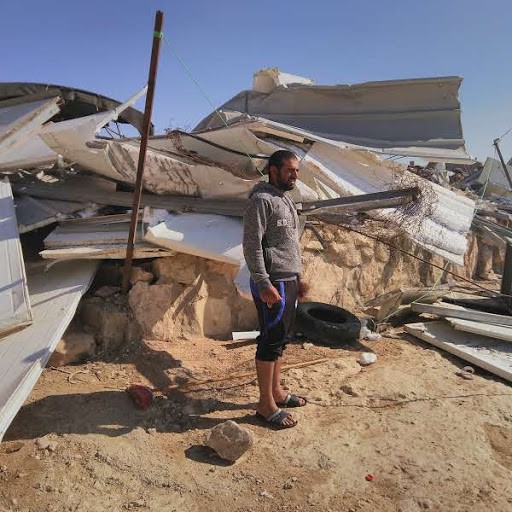‘They make me stronger to endure…We will build our houses again’
Nasser*, South Hebron Hills
Nasser* stood in front of his demolished house in the small village which was his home, in the South Hebron Hills of the West Bank of Palestine. The previous day his village had been surrounded by about 100 Israeli soldiers and 20 Border Police, while bulldozers and construction workers crushed houses and other structures deemed by the government of Israel to be illegal as they were built without planning permission. This permission is near impossible for Palestinians to obtain.
Seven structures were demolished, four families lost their homes, and two Palestinians were arrested. Nasser tells us he is upset but not downhearted. ‘This is normal,’ he said. ‘It happens. They [the State of Israel] think they will make me sad. They make me stronger to endure… We will build our houses again. We have no place to go. This is our place and our home. We were born here. Even if you make us sit in the open and damage [everything we have], we won’t move’.
Nasser stands in front of his demolished home
When asked how he felt, a man from another family said:
‘It’s sad but what will be will be. Al Hamdullilah [praise be to God]. We don’t need support. We are Muslims and we stand by ourselves’
All around us were flattened buildings and piles of household goods. The demolition exercise had been preceded during the night, from after midnight, by a house-to-house raid, so families had had little sleep. Eight villages across the South Hebron Hills had been raided from midnight to 4 a.m. that morning. Activists told us the Israeli military refused to give any reason or warrants for waking up sleeping children and parents, searching their rooms and belongings, and allegedly damaging items and furniture.
Demolitions are a very real threat hanging over Palestinian families. The United Nations Office for the Coordination of Humanitarian Affairs (UNOCHA) reports that the first half of 2019 has recorded an increase of 50 per cent in overall demolitions and 78 per cent in donor-funded structures demolished compared to the equivalent period in 2018.
In the occupied West Bank, divided by the Oslo Accords into three zones (A, B and C), the biggest potential for building and agricultural and economic development remains in ‘Area C’, the zone fully controlled by Israel. A Member of the Israeli Knesset [parliament], Moti Yogev (Habayit Hayehudi), has called Palestinian construction in Area C of the West Bank ‘construction terror’ echoing some who say the area must be defended against a ‘takeover’ by Palestinians (reported by the Israeli newspaper Haaretz).
The UN and number of human rights groups on the other hand emphasise that building permits are almost impossible for Palestinians to obtain (around 3% of applications are granted) and that ‘Firing Zones’ (closed military areas) are often declared but seldom used. According to the Israeli human rights organisation, B’Tselem, Israel strategically uses its control over planning in this zone to:
‘quash Palestinian planning and building. In about 60% of Area C – 36% of the West Bank – Israel has blocked Palestinian development by designating large swathes of land as state land, survey land, Firing Zones, nature reserves and national parks; (and) by allocating land to settlements and their regional councils…’
Israel has rapidly increased the building of Israeli settlements on occupied Paletsinian land in recent years, whilst limiting Palestinian construction. If Palestinians wish to build homes on the land they own, they are often vulnerable to demolition.
The Israeli military states it implements demolitions either because structures are illegal, or because they were built without a permit, built in a Firing Zone, or breach other planning and area restrictions. Nasser’s house and land were in a Firing Zone and has been the subject of extensive legal dispute for 40 years.
Whereas the Israeli authorities do very occasionally demolish settler outposts but those settlers are often compensated, as with the Amona and Netiv Ha’avot outposts. Increasingly, illegal outposts built on Palestinian land are neither moved nor demolished but instead receive support from the government to become legal, in a process Israeli NGO, Yesh Din refer to as ‘regularization’.
‘Regularization is a euphemism for violating Palestinians’ property rights and condoning landgrab (even if in a minority of cases landgrab was perpetrated unknowingly) and dispossessing the Palestinian landowners.’
The deportation or forcible transfer of residents in an occupied territory is absolutely forbidden under international law regardless of the motive (Fourth Geneva Convention, Article 49). It is permissible to temporarily evacuate residents but only in order to protect them or if their presence interferes with fighting taking place in the area. Once the danger has passed, there is an obligation to return them to their homes.
What does international law say?
*Names have been changed


